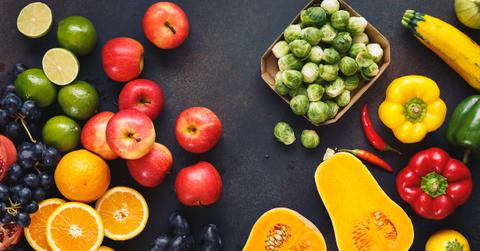2020’s Dirty Dozen and Clean Fifteen Are Here, To Help You Shop for Pesticide-Free Produce
The Dirty Dozen and Clean Fifteen were just released by the EWG, providing guidance on shopping for pesticide-free produce.
Updated April 10 2020, 9:31 a.m. ET

Every spring, the Environmental Working Group (EWG) publishes an updated Shopper's Guide to Pesticides in Produce, better known as the Dirty Dozen and Clean Fifteen. The guide aims to help consumers avoid fruits and vegetables that contain high concentrations of pesticides while saving money in the produce aisle.
The 2020 Dirty Dozen and Clean Fifteen lists recently dropped on the EWG’s website — and while the lists aren’t too different from last year, there was one pretty surprising finding. To see the full lists of which produce the EWG recommends buying organic and which the group recommends buying conventionally — and for a breakdown of what all that means — read on.
What are the Dirty Dozen and the Clean Fifteen?
The Dirty Dozen is a list of 12 fruits and vegetables that contain the highest concentrations of pesticides after being washed. Since organic produce is more expensive than conventional produce, and many people cannot afford to purchase organic fruits and veggies exclusively, the EWG recommends reserving your organic grocery budget for when you buy items that are part of the Dirty Dozen.
Conversely, the Clean Fifteen is a list of 15 fruits and vegetables that contain the lowest concentrations of pesticides after being washed. Since even conventional versions of these 15 foods have such low concentrations of pesticides by the time they are washed and reach our mouths, the EWG recommends buying these items conventionally to save money.
Conventional vs. organic produce
What’s the difference between organic and conventional produce, anyway?
Organically-grown produce is a crop that is grown without any synthetic chemicals, fertilizers, or pesticides. By definition, any food that is organic cannot be a genetically modified organism (GMO).
Conventionally-grown produce is an edible plant that was likely grown using synthetic fertilizers or pesticides. Conventionally-grown produce may or may not be genetically modified.
The 2020 Dirty Dozen
Here's the 2020 Dirty Dozen. These 12 fruits and vegetables contain higher concentrations of pesticides, so buy them organic when possible.
- Strawberries
- Spinach
- Kale
- Nectarines
- Apples
- Grapes
- Peaches
- Cherries
- Pears
- Tomatoes
- Celery
- Potatoes
- Bonus: hot peppers
Interestingly, the 2020 Dirty Dozen is exactly the same as the 2019 Dirty Dozen. So if you’ve been buying 2019’s Dirty Dozen items organic since last year, you can continue doing the same.
However, one of the “dirtiest” items this year is one that did not even make the list, because it's not technically fresh produce. For the first time since 2007, the USDA recently tested dried fruit — and 99 percent of the raisin samples tested contained residues of at least two pesticides. Had dried fruit been officially included in the lists this year, raisins would have been No. 1, according to the EWG. Since raisins are dried grapes, it's no surprise that grapes are No. 6 on the Dirty Dozen.
The 2020 Clean Fifteen
And here's the Clean Fifteen — the fifteen fruits and veggies (mushrooms included) that have the least pesticide residue.
- Avocados
- Sweet corn
- Pineapple
- Onions
- Papaya
- Sweet peas (frozen)
- Eggplant
- Asparagus
- Cauliflower
- Cantaloupe
- Broccoli
- Mushrooms
- Cabbage
- Honeydew melon
- Kiwi
The 2020 Clean Fifteen actually contains the same 15 items as 2019’s list — but the order is a bit different. So just like with the Dirty Dozen, if you’ve been buying the above 15 items conventionally for the past year, the EWG recommends that you keep doing so.
Where do the Dirty Dozen and Clean Fifteen lists come from?
Every year since 2004, the EWG compiles a new Shopper's Guide to Pesticides in Produce based on tests conducted on conventional produce by the USDA. Before conducting tests to determine pesticide concentrations, the researchers wash the produce how they would if they were going to eat it themselves. That means that washing fruits and vegetables does not remove all traces of pesticides.
No matter if your produce is organic or conventional, you should always wash it before eating it — especially as the novel coronavirus continues to spread around the world, it’s worth cleaning everything that comes into your home, including fruits that have inedible peels (such as avocados, mangos, and bananas).
Additionally, whether or not you have access to organic versions of the fruits and vegetables in the Dirty Dozen, don’t let that stop you from eating them.
“Although we believe consumers should be concerned about pesticide residues on the food they eat, the health benefits of a diet rich in fruits and vegetables outweigh the risks of pesticide exposure." Dr. Alexis Temkin, a toxicologist with the EWG, told MarketWatch.
Basically, while there are studies linking excessive pesticide exposure to various health issues, and while the Dirty Dozen and Clean Fifteen are great guides for limiting your pesticide intake, it’s still better to eat conventional fruits and vegetables rather than no fruits and vegetables at all.